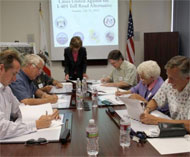8/17/2012
Public Officials Upset Over TollingWashington, DC area politicians upset at toll road agency mismanagement. California mayors oppose imposition of tolls on local freeway.

The governors of two states, the US transportation secretary and the mayor of Washington, DC on Tuesday blasted the governing body of the Dulles Toll Road in Virginia. Meanwhile, a group of six mayors in Orange County, California have banded together to lobby against a proposal to impose tolls on the Interstate 405 freeway.
Motorists in the Old Dominion are paying rapidly rising tolls to subsidize the $7 billion Metrorail extension to the Dulles International Airport. The toll road, rail project and airport are under the control of the Metropolitan Washington Airport Authority (MWAA), which is in turn run by a board appointed by the governors of Virginia and Maryland, the US Department of Transportation (DOT) secretary and the DC mayor. The latter officials cited an investigation by the DOT's inspector general that showed motorists were subsidizing not just the pricey transit project, but also underwriting the lavish lifestyle of MWAA board members.
"Overall, the report depicts an organization that conducts much of its business behind coded doors, awards many of its contracts on a sole-source basis, and is in desperate need of reform," the letter stated. "Against this backdrop, we are outraged by ongoing reports describing questionable dealings, including the award of numerous lucrative no-bid contracts to former board members and employees and the employment of former board members. It has become clear that MWAA's policies and procedures are deficient and lack the safeguards necessary to ensure the principled oversight of nationally and regionally significant assets."
The inspector general's interim report pointed out how neither state nor federal ethics laws apply to MWAA, giving its board members freedom to act without fear of criminal or civil penalties.
"Our ongoing review has revealed a culture that is largely unaccustomed to external audits and inquiries by the accountability community," DOT Inspector General Calvin L. Scovel III wrote in a May 15 letter to US Representative Frank R. Wolf (R-Virginia) and Tom Latham (R-Iowa). "For example, one board member was reimbursed $238 for two bottles of wine purchased during a meal -- an allowable expense under MWAA's board policy. Another voucher we reviewed contained meal expenses for some board members and their guests during a trip to Hawaii for a conference. The cost for three dinners totaled approximately $4,800."
In 2009, MWAA set the "revenue-maximizing toll" level at $7, even though the Virginia Department of Transportation estimated just four years earlier that it should be $2. The preliminary audit suggested changes in population and traffic levels contributed to the increase, but that the "striking" jump remained suspicious.
"While the two factors we identified likely contributed significantly to the growth in the estimated revenue-maximizing toll between the two studies, it remains unclear whether they can explain the entire difference," Scovel wrote.
Mismanagement aside, the Virginia, Maryland and DC officials remain major backers of tolling. The same cannot be said for the leaders of the Southern California cities of Costa Mesa, Fountain Valley, Huntington Beach, Los Alamitos, Seal Beach and Westminster. Mayors from the six towns are unanimous in their opposition to adding tolls to a major freeway that runs through their jurisdiction. On July 31 they sent a joint letter opposing the Orange County Transportation Authority (OCTA) plan to install a toll lane without adding any net new free capacity to I-405. The plan adds a general purpose lane but takes away an existing carpool lane for use in a new, two-lane high-occupancy toll facility. Instead, the mayors want "Alternative 2," a plan that adds a pair of general purpose lanes, saving $300 million over the cost of "Alternative 3," the toll lanes.
"Alternative 2 provides the greatest travel time savings and vehicle capacity in the general purpose lanes and does not convert existing lanes to toll lanes nor require the paying of tolls," the mayors wrote. "The number of lanes that are available 'free' for the public for most of the stretch of the freeway for Alternative 3 remains the same as currently exists, at five lanes total, whereas Alternative 2 proposes seven (Free) lanes... Alternative 2 represents a better utilization of land and money resources."
The mayors hope the OCTA will go with adding general purpose capacity as the "locally preferred option" at the agency's September 24 meeting. The California Department of Transportation will make the final decision in the fall.
Correction: The description of Alternative 3 has been updated to more accurately reflect the addition of a general purpose lane.


